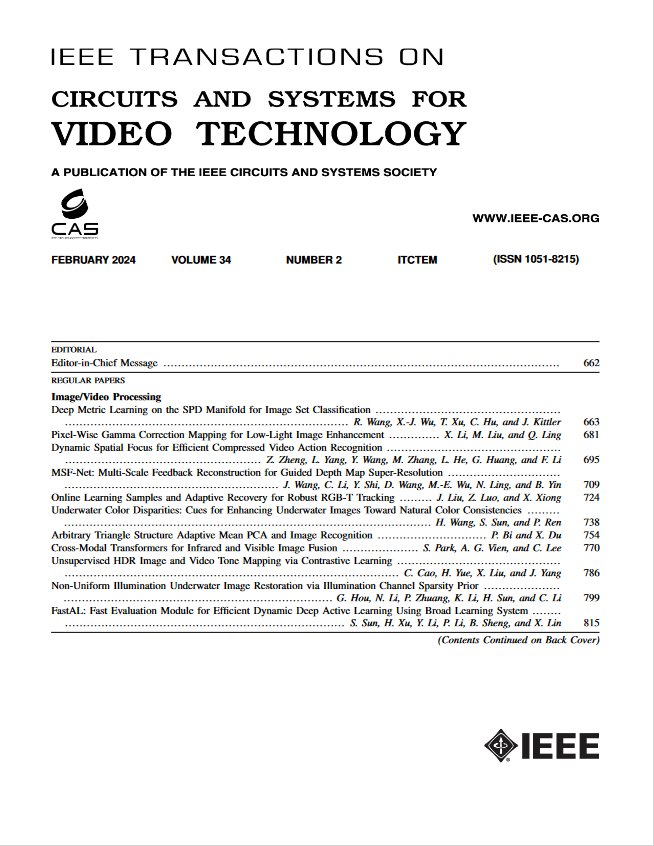LPFSformer: Location Prior Guided Frequency and Spatial Interactive Learning for Nighttime Flare Removal
IF 8.3
1区 工程技术
Q1 ENGINEERING, ELECTRICAL & ELECTRONIC
IEEE Transactions on Circuits and Systems for Video Technology
Pub Date : 2024-12-04
DOI:10.1109/TCSVT.2024.3510925
引用次数: 0
Abstract
When capturing images under strong light sources at night, intense lens flare artifacts often appear, significantly degrading visual quality and impacting downstream computer vision tasks. Although transformer-based methods have achieved remarkable results in nighttime flare removal, they fail to adequately distinguish between flare and non-flare regions. This unified processing overlooks the unique characteristics of these regions, leading to suboptimal performance and unsatisfactory results in real-world scenarios. To address this critical issue, we propose a novel approach incorporating Location Prior Guidance (LPG) and a specialized flare removal model, LPFSformer. LPG is designed to accurately learn the location of flares within an image and effectively capture the associated glow effects. By employing Location Prior Injection (LPI), our method directs the model’s focus towards flare regions through the interaction of frequency and spatial domains. Additionally, to enhance the recovery of high-frequency textures and capture finer local details, we designed a Global Hybrid Feature Compensator (GHFC). GHFC aggregates different expert structures, leveraging the diverse receptive fields and CNN operations of each expert to effectively utilize a broader range of features during the flare removal process. Extensive experiments demonstrate that our LPFSformer achieves state-of-the-art flare removal performance compared to existing methods. Our code and a pre-trained LPFSformer have been uploaded to GitHub for validation.LPFSformer:夜间耀斑去除的位置优先引导频率和空间互动学习
在夜间强光源下捕捉图像时,经常会出现强烈的镜头耀斑伪影,严重降低视觉质量,影响下游计算机视觉任务。虽然基于变压器的方法在消除夜间耀斑方面取得了显著效果,但它们无法充分区分耀斑和非耀斑区域。这种统一的处理方式忽略了这些区域的独特特征,导致在实际应用中性能不佳,效果不尽人意。为了解决这一关键问题,我们提出了一种结合位置先导引导(LPG)和专门的耀斑去除模型 LPFSformer 的新方法。LPG 的设计目的是准确了解耀斑在图像中的位置,并有效捕捉相关的辉光效果。通过采用位置先验注入(LPI),我们的方法通过频域和空间域的交互作用,将模型的焦点引向耀斑区域。此外,为了增强对高频纹理的恢复并捕捉更精细的局部细节,我们设计了一个全局混合特征补偿器(GHFC)。GHFC 集合了不同的专家结构,利用每个专家的不同感受野和 CNN 操作,在耀斑去除过程中有效利用更广泛的特征。大量实验证明,与现有方法相比,我们的 LPFSformer 实现了最先进的耀斑去除性能。我们的代码和预训练的 LPFSformer 已上传至 GitHub 供验证。
本文章由计算机程序翻译,如有差异,请以英文原文为准。
求助全文
约1分钟内获得全文
求助全文
来源期刊
CiteScore
13.80
自引率
27.40%
发文量
660
审稿时长
5 months
期刊介绍:
The IEEE Transactions on Circuits and Systems for Video Technology (TCSVT) is dedicated to covering all aspects of video technologies from a circuits and systems perspective. We encourage submissions of general, theoretical, and application-oriented papers related to image and video acquisition, representation, presentation, and display. Additionally, we welcome contributions in areas such as processing, filtering, and transforms; analysis and synthesis; learning and understanding; compression, transmission, communication, and networking; as well as storage, retrieval, indexing, and search. Furthermore, papers focusing on hardware and software design and implementation are highly valued. Join us in advancing the field of video technology through innovative research and insights.

 求助内容:
求助内容: 应助结果提醒方式:
应助结果提醒方式:


